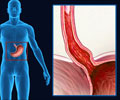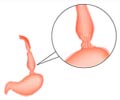Researchers are exploring the role of Vitamin D in preventing esophageal cancer.

"Vitamin D is being studied for its role in possibly reducing the risk of developing several types of cancer, such as colon, breast and prostate," says Dr. Cummings, a gastroenterologist with the UH Digestive Health Institute and Assistant Professor at Case Western Reserve University School of Medicine. "This novel study is the first-of-its-kind looking at Vitamin D's potential role in helping to prevent esophageal cancer." According to co-investigator Sanford Markowitz, MD, Ingalls Professor of Cancer Genetics at Case Western Reserve University School of Medicine and oncologist with UH Case Medical Center, the study "has the potential to make a highly important contribution to the medical management of Barrett's esophagus, which is becoming an ever increasing challenge."
The study is funded by the National Institutes of Health and American College of Gastroenterology through Case Western Reserve University School of Medicine and was awarded in July.
Over the last 30 years, there has been a dramatic rise in Barrett's esophagus, a change in the lining of the esophagus that is a precursor to esophageal cancer. In this study, researchers are examining if Vitamin D intake is linked to an increase in a protein called 15-PGDH (15-prostaglandin dehydrogenase), which may help prevent Barrett's from turning into cancer. Patients with Barrett's esophagus will take Vitamin D weekly (50,000 IU) for up for four months, and their levels of 15-PGDH will be measured.
Source-Eurekalert














